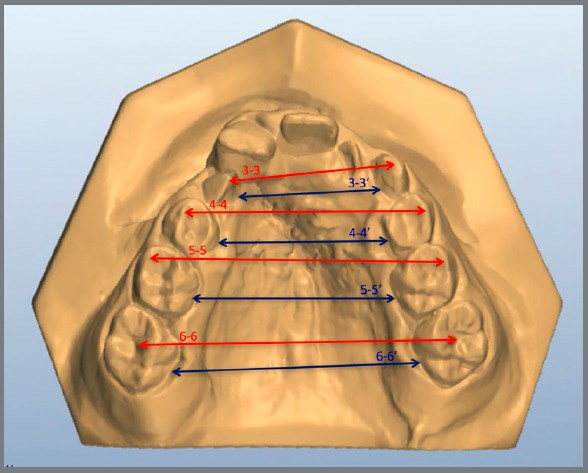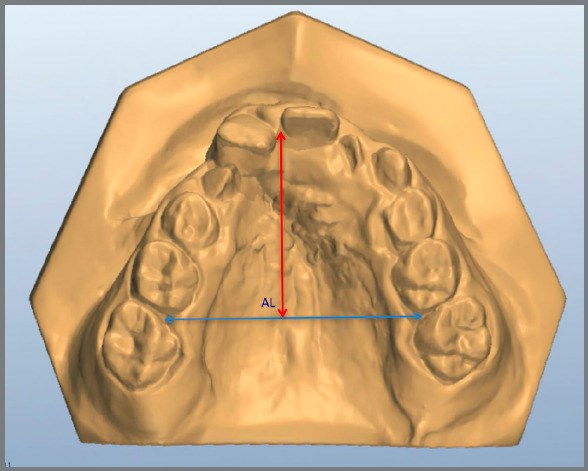Intercenter comparison of slow and rapid maxillary expansion in unilateral complete cleft lip and palate
Affiliations
Affiliations
- Universidade Estadual Paulista, Faculdade de Odontologia, Departamento de Ortodontia (Araraquara/SP, Brazil).
- Universidade de São Paulo, Faculdade de Odontologia de Bauru, Departamento de Ortodontia, Hospital de Reabilitação de Anomalias Craniofaciais (Bauru/SP, Brazil).
- The Armed Forces Hospital (Kuwait City, Kuwait).
- University of Southern California, Ostrow School of Dentistry (Los Angeles/CA, USA).
- Children's Hospital Los Angeles, Division of Dentistry (Los Angeles/CA, USA).
- Universidade de São Paulo. Faculdade de Odontologia de Bauru, Departamento de Fonoaudiologia e Audiologia (Bauru/SP, Brazil).
- University of Southern California, Center for Craniofacial Molecular Biology (Los Angeles/CA, USA).
- Children's Hospital Los Angeles, Craniofacial and Special Care Orthodontics (Los Angeles/CA, USA).
Abstract
Objective: The aim of this study was to compare the occlusal changes of rapid maxillary expansion (RME) and slow maxillary expansion (SME) in patients with unilateral complete cleft lip and palate (UCLP), by means of digital dental models.
Methods: Group RME was composed by 22 patients (13 males and 9 females), with mean age of 9.9 years, treated with rapid maxillary expansion with Hyrax appliance in Center 1. Group SME was composed by 29 patients (14 females and 15 males), with mean age of 10.7 years, treated with slow maxillary expansion with quad-helix appliance in Center 2. Digital dental models of the maxillary dental arch were obtained immediately pre-expansion (T1) and 6-month post-expansion (T2). Transversal distances, arch perimeter, arch length, palatal depth, palatal volume and posterior tooth inclination were digitally measured. Interphase and intergroup comparisons were performed with paired t-test and independent t-test, respectively.
Results: Intercanine expansion was 4 to 5mm in both groups, and increase in the intercanine distance was similar for both groups. RME group showed a greater increase in arch distances at the region of permanent premolar and molars, compared to SME group. Arch perimeter increase was greater for RME group, compared to SME. No differences were found for arch length, palatal depth, palatal volume and posterior tooth buccal tipping.
Conclusion: RME and SME produced similar dentoalveolar outcomes, with greater amount of expansion on RME group.
Conflict of interest statement
The authors report no commercial, proprietary or financial interest in the products or companies described in this article.
Figures
Similar articles
Alkadhi OH, Alotaibi LH, Alrashoud RR, Almutairi MH, Al Matar HA, Mallineni SK.Children (Basel). 2023 Apr 23;10(5):762. doi: 10.3390/children10050762.PMID: 37238310 Free PMC article. Review.
de Medeiros Alves AC, Garib DG, Janson G, de Almeida AM, Calil LR.Clin Oral Investig. 2016 Sep;20(7):1837-47. doi: 10.1007/s00784-015-1675-1. Epub 2015 Dec 1.PMID: 26620733 Clinical Trial.
de Almeida AM, Ozawa TO, Alves ACM, Janson G, Lauris JRP, Ioshida MSY, Garib DG.Clin Oral Investig. 2017 Jun;21(5):1789-1799. doi: 10.1007/s00784-016-1943-8. Epub 2016 Aug 22.PMID: 27550292 Clinical Trial.
Ayub PV, Janson G, Gribel BF, Lara TS, Garib DG.Am J Orthod Dentofacial Orthop. 2016 May;149(5):705-15. doi: 10.1016/j.ajodo.2015.11.022.PMID: 27131253
Yang CJ, Pan XG, Qian YF, Wang GM.Oral Surg Oral Med Oral Pathol Oral Radiol. 2012 Jul;114(1):e25-30. doi: 10.1016/j.tripleo.2011.08.030. Epub 2012 Feb 28.PMID: 22732853 Review.
Cited by
Alkadhi OH, Alotaibi LH, Alrashoud RR, Almutairi MH, Al Matar HA, Mallineni SK.Children (Basel). 2023 Apr 23;10(5):762. doi: 10.3390/children10050762.PMID: 37238310 Free PMC article. Review.
KMEL References
References
-
- Silva OG, Filho, Ramos AL, Abdo RC. The influence of unilateral cleft lip and palate on maxillary dental arch morphology. Angle Orthod. 1992;62(4):283–290. - PubMed
-
- Freitas JA, Garib DG, Oliveira M, Lauris RC, Almeida AL, Neves LT. Rehabilitative treatment of cleft lip and palate experience of the Hospital for Rehabilitation of Craniofacial Anomalies - USP (HRAC-USP) - part 2: pediatric dentistry and orthodontics. J Appl Oral Sci. 2012;20(2):268–281. - PMC - PubMed
-
- Pan X, Qian Y, Yu J, Wang D, Tang Y, Shen G. Biomechanical effects of rapid palatal expansion on the craniofacial skeleton with cleft palate a three-dimensional finite element analysis. Cleft Palate Craniofac J. 2007;44(2):149–154. - PubMed
-
- Brunetto M, Andriani JS, Ribeiro GL, Locks A, Correa M, Correa LR. Three-dimensional assessment of buccal alveolar bone after rapid and slow maxillary expansion a clinical trial study. Am J Orthod Dentofacial Orthop. 2013;143(5):633–644. - PubMed
-
- Almeida AM, Ozawa TO, Alves ACM, Janson G, Lauris JRP, Ioshida MSY. Slow versus rapid maxillary expansion in bilateral cleft lip and palate a CBCT randomized clinical trial. Clin Oral Investig. 2017;21(5):1789–1799. - PubMed
-
- Medeiros Alves AC, Garib DG, Janson G, Almeida AM, Calil LR. Analysis of the dentoalveolar effects of slow and rapid maxillary expansion in complete bilateral cleft lip and palate patients a randomized clinical trial. Clin Oral Investig. 2016;20(7):1837–1847. - PubMed
-
- Garib DG, Henriques JF, Janson G, Freitas MR, Coelho RA. Rapid maxillary expansion--tooth tissue-borne versus tooth-borne expanders a computed tomography evaluation of dentoskeletal effects. Angle Orthod. 2005;75(4):548–557. - PubMed
-
- Ayub PV, Janson G, Gribel BF, Lara TS, Garib DG. Analysis of the maxillary dental arch after rapid maxillary expansion in patients with unilateral complete cleft lip and palate. Am J Orthod Dentofacial Orthop. 2016;149(5):705–715. - PubMed
-
- Andrews LF. The six keys to normal occlusion. Am J Orthod. 1972;62(3):296–309. - PubMed
-
- Dahlberg G. Statistical methods for medical and biological students. London: George Alien and Unwin; 1940.
-
- Houston WJ. The analysis of errors in orthodontic measurements. Am J Orthod. 1983;83(5):382–390. - PubMed
-
- Dalstra M, Melsen B. From alginate impressions to digital virtual models accuracy and reproducibility. J Orthod. 2009;36(1):36–41. - PubMed
-
- Reuschl RP, Heuer W, Stiesch M, Wenzel D, Dittmer MP. Reliability and validity of measurements on digital study models and plaster models. Eur J Orthod. 2016;38(1):22–26. - PubMed
-
- Santos PBD, Janson G, Assis VH, Battisti MPL, Garib DG. Association between dental arch widths and interarch relationships in children with operated unilateral complete cleft lip and palate. Cleft Palate Craniofac J. 2015;52(6):e196–e200. - PubMed
-
- Ross RB. The clinical implications of facial growth in cleft lip and palate. Cleft Palate J. 1970;7:37–47. - PubMed
-
- Bardach J. The influence of cleft lip repair on facial growth. Cleft Palate J. 1990;27(1):76–78. - PubMed
-
- Alves ACM, Janson G, McNamara JA, Jr, Lauris JRP, Garib DG. Maxillary expander with differential opening vs Hyrax expander a randomized clinical trial. Am J Orthod Dentofacial Orthop. 2020;157(1):7–18. - PubMed


